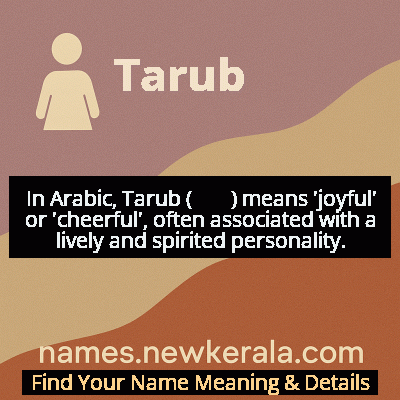Tarub Name Meaning & Details
Origin, Popularity, Numerology Analysis & Name Meaning of Tarub
Discover the origin, meaning, and cultural significance of the name TARUB. Delve into its historical roots and explore the lasting impact it has had on communities and traditions.
Name
Tarub
Gender
Female
Origin
Muslim
Lucky Number
8
Meaning of the Name - Tarub
In Arabic, Tarub (طرب) means 'joyful' or 'cheerful', often associated with a lively and spirited personality.
Tarub - Complete Numerology Analysis
Your Numerology Number
Based on Pythagorean Numerology System
Ruling Planet
Saturn
Positive Nature
Ambitious, efficient, realistic, and authoritative.
Negative Traits
Materialistic, stressed, confrontational, and can be overly ambitious.
Lucky Colours
Dark blue, black.
Lucky Days
Saturday.
Lucky Stones
Blue sapphire, amethyst.
Harmony Numbers
2, 4, 6.
Best Suited Professions
Business leaders, managers, financial services, law enforcement.
What People Like About You
Leadership, determination, organizational skills.
Famous People Named Tarub
Tarub bint al-Mansur
Historical Noblewoman
Prominent figure in Andalusian history known for cultural patronage
Tarub al-Kabira
Court Influencer
Influential woman in Abbasid court circles documented in historical records
Tarub bint Abdullah
Modern Educator
Contemporary Islamic scholar and women's education advocate
Name Variations & International Equivalents
Click on blue names to explore their detailed meanings. Gray names with will be available soon.
Cultural & Historical Significance
Extended Personality Analysis
Women named Tarub are typically characterized by their radiant positivity and emotional intelligence, often serving as emotional anchors in their families and social circles. Their inherent cheerfulness is not superficial but stems from a deep-seated optimism and resilience that enables them to navigate life's challenges with grace and perspective. Tarubs tend to be natural harmonizers who excel in conflict resolution and community building, using their emotional awareness to understand multiple viewpoints and find common ground. They often display creative talents, particularly in arts, communication, or education, where their joyful disposition can inspire and motivate others. While socially engaged, Tarubs also value introspection and personal growth, balancing their outward cheer with thoughtful contemplation. Their leadership style typically emphasizes collaboration and empowerment rather than authority, making them effective in roles that require building consensus and fostering positive environments. The combination of emotional warmth and practical wisdom makes individuals named Tarub particularly adept at maintaining relationships and creating supportive networks that benefit their entire community.
Modern Usage & Popularity
In contemporary naming practices, Tarub maintains a niche but meaningful presence among Muslim families seeking names that blend traditional roots with positive modern connotations. While not appearing on most popular baby name charts, it enjoys consistent usage particularly in educated, urban Muslim communities where parents value both cultural heritage and distinctive naming choices. The digital age has contributed to Tarub's visibility through online naming resources and social media platforms where Muslim parents share and discover less common traditional names. In Western countries with significant Muslim populations, Tarub represents a choice that balances cultural authenticity with ease of pronunciation in multicultural settings. Recent years have shown a slight uptick in usage as part of the broader 'meaningful naming' trend, where parents prioritize names with positive meanings and historical depth over fleeting fashion. The name's melodic quality and unambiguous positive meaning make it particularly appealing to contemporary parents who want their daughters to carry a name that embodies happiness and cultural pride in an increasingly globalized world.
Symbolic & Spiritual Meanings
Beyond its literal meaning of happiness, Tarub carries rich symbolic significance that resonates across cultural and spiritual dimensions. In Islamic symbolism, the name represents the concept of 'farah' (joy) as a blessing and reflection of spiritual contentment, connecting to Quranic teachings about finding happiness through faith and gratitude. Metaphorically, Tarub symbolizes the flowering of human potential—much like a plant reaching full bloom—suggesting development, beauty, and the realization of inherent qualities. The name also embodies the idea of emotional abundance, representing not just personal happiness but the capacity to generate joy in one's environment and relationships. In cultural contexts, Tarub often symbolizes the heart's resilience—the ability to maintain inner light despite external darkness, reflecting universal human aspirations for emotional strength and positive transformation. The symbolic weight of Tarub makes it more than just a name; it becomes an aspiration for living with joy, grace, and emotional authenticity in a complex world.

